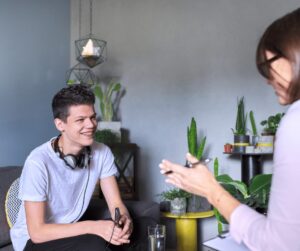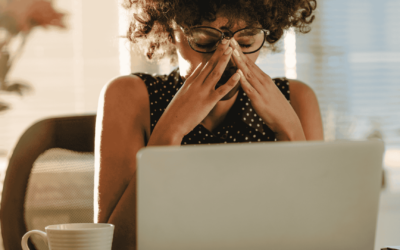It can seem harmless, the time spent scrolling social media, laughing at funny cat videos–but is it? If you’ve found yourself feeling more anxious or depressed in spite of the funny cat videos, you’re not alone.
Social media has become an integral part of modern life, shaping how individuals communicate, interact, and perceive themselves and others. While there are some undeniable benefits, the pervasive use of social media platforms has raised concerns about its impact on mental health. Here, our experienced therapists at Simi Psychological Group share more about the impact of social media on mental health and the ways in which therapy can help. If you are looking for an anxiety therapist near me in Simi Valley, then reach out to our expert team today.
Laughter and Connection
Before we head into the bad stuff, let’s take a moment to acknowledge the good. Social media, when used responsibly, can be a source of meaningful connection to others, including long-distance friends and relatives. There are heartwarming stories of human kindness achieved through the use of social media, such as the return of a beloved long-lost pet, strangers helping strangers, positive actions within a community, and the righting of wrongs. And of course, there are the funny cat (and other animal) videos, as well as other sources of online comedy. All of these examples can lead to positive emotions and the “feel-good” experiences that promote emotional wellness and mental health.

Having said that, let’s move on to the dark side.
The Dark Side of Social Media
Comparisons
Theodore Roosevelt once said, “Comparison is the thief of joy,” a sentiment that has proven to be profoundly accurate. Social media platforms offer a curated glimpse into the lives of others, often showcasing idealized versions of reality.
This constant exposure to filtered images and carefully crafted narratives can fuel feelings of inadequacy and low self-esteem among users.
Comparison is a natural consequence of this curated content and can lead to negative self-perception and a sense of inadequacy. Research has linked excessive social media use to increased symptoms of depression, anxiety, and loneliness, particularly among vulnerable populations such as adolescents and young adults.

Do you struggle with anxiety? Take a look at our blog Unleashing the Power of Chill: How to Stop Overthinking.
Cyberbullying and Negativity
It used to be true that if a child or adolescent was having a hard time with peers in school, they’d at least get a break from that negativity during non-school hours.
In today’s society, however, smartphones and access to social media means kids are vulnerable 24/7. They don’t get a break.
This relentless exposure to cyberbullying and online harassment through social media exacerbates mental health issues. The constant bombardment of negative comments, trolling, and cyberbullying can have devastating effects on an individual’s mental well-being, leading to feelings of worthlessness, anxiety, and even suicidal ideation.
For more on social media and teens, check out our blog How Does Social Media Affect Teenagers?
While kids and teens are especially vulnerable, the negative impact that social media trash-talking has on adults is also quite clear. The anonymity afforded by online platforms can embolden individuals to engage in hurtful behaviors they might not exhibit in face-to-face interactions.

Such comments sting regardless of one’s age and your whole day might be ruined by one nasty remark from some online troll. Adults are not immune to the feelings of worthlessness, anxiety, and depression that are triggered by cyberbullying.
Addiction
The addictive nature of social media further compounds its detrimental impact on mental health. The dopamine rush associated with receiving likes, comments, and shares can create a cycle of dependency, leading to compulsive use and neglect of real-world interactions.
Excessive screen time has been linked to poor sleep quality, reduced productivity, and increased feelings of stress and anxiety, all of which can take a toll on mental health over time.

Safety
Social media is also ripe with risks for both young and old. Predators of all kinds take full advantage of the ability to hide behind a screen, whether they are sexual predators or scammers eager to take advantage of unsuspecting individuals.
In addition to the risk to physical safety, the emotional and psychological damage that can result from an experience with an online predator can be serious and long-lasting.
Therapy as a Tool for Healing
In the face of these challenges, therapy emerges as a crucial intervention for individuals struggling with the negative effects of social media on their mental health. If you are suffering from increased anxiety or depression, therapy offers a safe space to process emotions, and explore your thoughts, feelings, and behaviors in a non-judgmental environment.
Therapists are equipped with specialized training that can help clients identify and challenge negative thought patterns fueled by social media comparison.

Cognitive-behavioral therapy (CBT), in particular, has shown promise in treating individuals with social media-related mental health issues.
By targeting maladaptive beliefs and behaviors, CBT helps clients develop healthier coping mechanisms and build resilience against the onslaught of social media-induced stressors.
Through structured exercises and homework assignments, clients learn to reframe their thoughts, manage their emotions, and develop healthier habits around social media usage.
Therapy fosters self-awareness and introspection, empowering individuals to recognize the impact of social media on their mental well-being and make informed decisions about their online behavior.
By cultivating mindfulness and self-compassion, therapy equips individuals with the tools they need to navigate the digital landscape without sacrificing their mental health.
In the face of negativity, therapy also provides a support system for individuals grappling with the psychological consequences of cyberbullying and online harassment. Therapists offer validation, empathy, and practical strategies for coping with and overcoming the trauma inflicted by online abuse. Through trauma-focused interventions, such as those offered by our trauma-informed therapists in Simi Valley, clients can process their experiences, reduce distressing symptoms, and reclaim a sense of safety and agency in their online interactions.

Not sure whether therapy is right for you? Check out our blog, 7 Reasons Why You Should Seek Support for your Mental Health.
Social media’s impact on mental health is a complex and multifaceted phenomenon, characterized by both positive and negative consequences. While social media offers connectivity, information-sharing, and community-building opportunities, it also poses significant risks to mental well-being, including heightened levels of stress, anxiety, depression, and social isolation.
Therapy emerges as a valuable resource for individuals grappling with the adverse effects of social media on their mental health. Through evidence-based interventions such as cognitive-behavioral therapy, individuals can develop the skills and resilience needed to navigate the digital landscape mindfully and protect their mental well-being in an increasingly connected world.
Ultimately, by recognizing the interplay between social media and mental health and investing in therapeutic interventions, we can foster healthier online environments and empower individuals to cultivate fulfilling and balanced lives both on and off-screen.
Simi Psychological Group offers anxiety therapy in Simi Valley and the surrounding areas, as well as mental health services to meet the needs of the whole family. Our experienced and compassionate therapists treat children, adolescents, and adults, and offer group counseling and couples counseling as well.
Contact us today for more information or a free consultation at 805-842-1994.

Dr. Novak is the group practice owner and licensed psychologist at Simi Psychological Group a therapy practice in Simi Valley, California. Simi Psychological Group offers a variety of services including trauma therapy, couples therapy, anxiety therapy, teen therapy, and more. Simi Psychological Group emphasizes the importance of creating real change by making sure to get to the root of your struggles.



